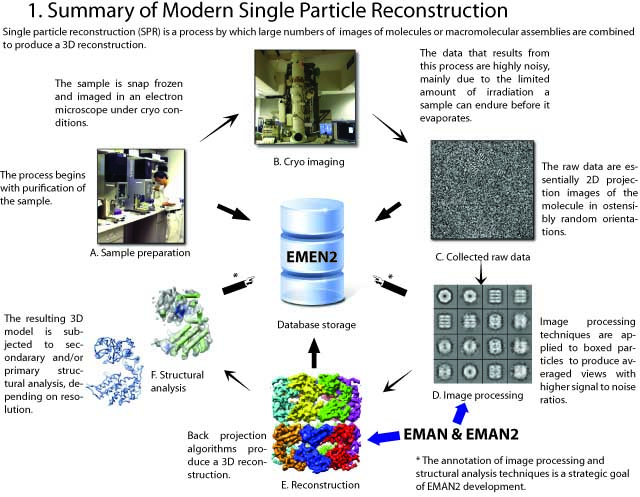|
Size: 6985
Comment:
|
Size: 7141
Comment:
|
| Deletions are marked like this. | Additions are marked like this. |
| Line 30: | Line 30: |
| * Made the main [[http://blake.bcm.edu/eman2/doxygen_html/classEMAN_1_1FourierReconstructor.html| Fourier reconstructor ]] work, generalizing it so that there is a lot of flexibility with respect to padding and dimensions. | * Made the main [[http://blake.bcm.edu/eman2/doxygen_html/classEMAN_1_1FourierReconstructor.html| Fourier reconstructor ]] work, generalizing it so that there is a lot of flexibility with respect to padding and dimensions. I refactored and tweaked the [[http://blake.bcm.edu/eman2/doxygen_html/classEMAN_1_1BackProjectionReconstructor.html| back projection]] reconstructor too. |
Contents
David Woolford
Have a look at a gallery that I made as I wrote some OpenGL widgets, and another one.
Here is a figure depicting the workflow, which was for a poster.
See my old project: SwarmPS
What is Single Particle Reconstruction?
If you want to figure out where all of the atoms of a protein are arranged in space, how do you do it? There are several techniques for doing this, the one we use is called single particle reconstruction.
|
Overview of single particle reconstruction |
In this flow diagram my primary role is the development of EMAN2, which is an large suite of image processing algorithms and interfaces.
C++
Some of my work in EMAN2
Here are a few of the C++ classes that I wrote in EMAN2
Made the main Fourier reconstructor work, generalizing it so that there is a lot of flexibility with respect to padding and dimensions. I refactored and tweaked the back projection reconstructor too.
Abstracted the method of 3D Fourier pixel insertion, and implemented the closely related method of calculating the interpolated Fourier ring correlation from scratch.
Wrote the 3D symmetry classes, which was very satisfying, probably because there is a finite number of 3D symmetries and we support them all, so the code is never likely to change. I also wrote the orientation generating classes, which are just cool.
I rewrote the transform class, and templated the 3D vector and 2D vector classes. Maybe we should have used template unrolling to generalize for dimensions? If it ain't broke...
Poured through the aligners, rewriting and fixing them as needed.
I know it's only a single function, but robust inplace clipping an image of 1,2 or 3 dimensions is a tricky job, but once implemented is very useful (we work on big images). In a similar vein, in EMAN2 the phase shifting and Fourier origin shifting processors work in place, for all dimensions, and for all combinations of even and odd dimensions.( phase processor, Fourier processor). Very cool.
Incorporated FTGL - basically wrapped FTGL to suit our needs. We expose or C++ in Python and end up using it that way.
Patterns in EMAN2
We use a nifty Factory for just about everything.
We have an object that can be of "any" type, sometimes referred to as the Variant pattern. We pass it around in Dictionaries, specifically for communicating to and from Python and C++. The use of the EMObject and the Dict is all-pervasive in EMAN2.
Extensive use of the Strategy pattern, for alignment, projection, comparison, processing, and orientation generation, to name a few.
C++ is sometimes like what you call the name of a song...
A friend once told me that this is exert, taken from Alice in Wonderland, reminded him of C++
You are sad, the Knight said in an anxious tone: let me sing you a song to comfort you.
Is it very long? Alice asked, for she had heard a good deal of poetry that day.
It's long, said the Knight, but very, very beautiful. Everybody that hears me sing it -- either it brings the tears into their eyes, or else --
Or else what? said Alice, for the Knight had made a sudden pause.
Or else it doesn't, you know. The name of the song is called "Haddocks' Eyes."
Oh, that's the name of the song, is it? Alice said, trying to feel interested.
No, you don't understand, the Knight said, looking a little vexed. That's what the name is called. The name really is "The Aged Aged Man."
Then I ought to have said "That's what the song is called"? Alice corrected herself.
No, you oughtn't: that's quite another thing! The song is called "Ways and Means": but that's only what it's called, you know!
Well, what is the song, then? said Alice, who was by this time completely bewildered.
I was coming to that, the Knight said. The song really is "A-sitting On A Gate": and the tune's my own invention.
Cuda
You can't see the CUDA on the web because the machine which builds this documentation does not have the CUDA_FLAG on. But here is some EMAN2 code that is already cuda enabled.
Links
Why many calls to cudaFree/cudaMalloc seems to cause havoc
Why cudaMemcpyDeviceToDevice seems to fail
Does MathML work ?
$$sqrt(a^2+b^2)$$
`G(f) = exp(-f^2/(2 sigma_f^2))`
Let's try some interesting formulas:
E=m c2
and ei pi=-1
and AA x in CC (sin2x +cos2x=1)
and one more: sum_(i=1)n i3=((n(n+1))/2)2
Trivial examples.
First, using asciimath formatting. `a+b`
Then, using latex format.
$$\frac{d}{dx}f(x)=\lim_{h\to 0}\frac{f(x+h)-f(x)}{h}$$
Email: <woolford AT SPAMFREE bcm DOT edu>
...

